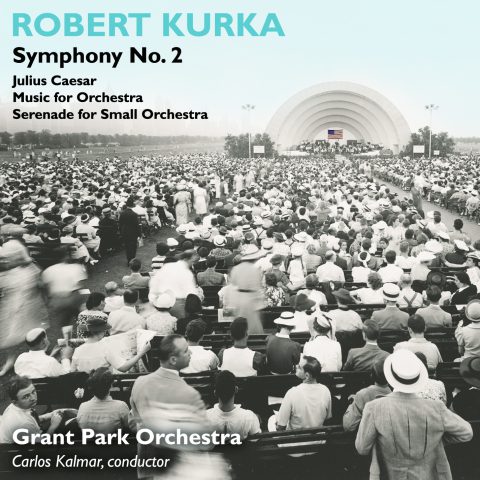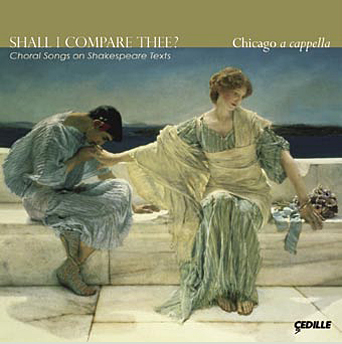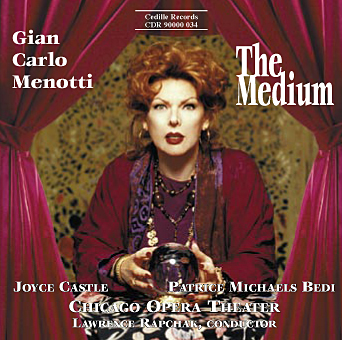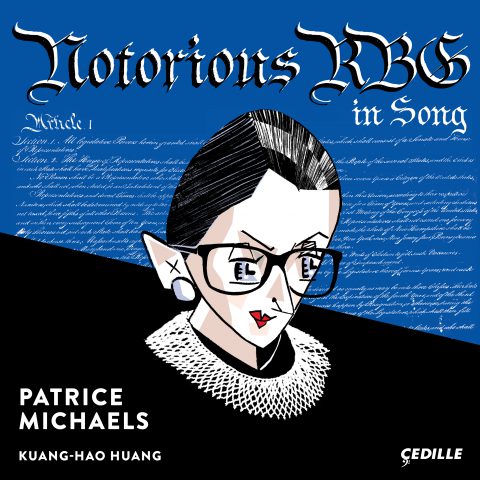Store
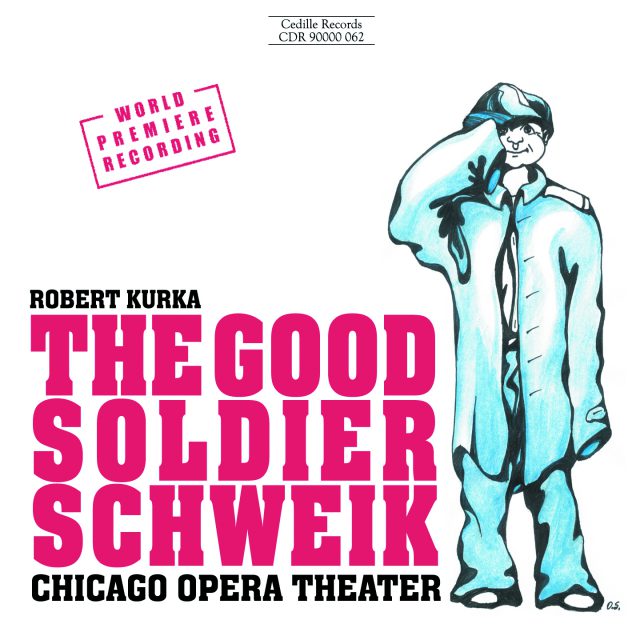
Store
Robert Kurka: The Good Soldier Schweik
Robert Kurka, Buffy Baggott, Alexander Platt, Jason Collins, Kelli Harrington, Marc Embree
More than four decades after its 1958 debut, American composer Robert Kurka’s hilarious, satirical opera The Good Soldier Schweik returns to active duty with a complete, world premiere recording on Cedille Records.
Based on Jaroslav Hasek’s classic Czech novel of the same name, Schweik lampoons World War I era Europe through a musical score infused with dances, marches, ballads, jazz, and Weill-esque cabaret.
“Think of a manic hybrid between ‘Mahagonny,’ ‘Wozzeck,’ and ‘Catch 22,’ as staged by the Marx Brothers – that’s ‘Schweik’,” writes the Chicago Tribune‘s John von Rhein.
This new 2-CD set captures all the wit and sparkle of the Chicago Opera Theater’s March 2001 staging, which Opera News called a “triumph . . . it would be hard to imagine a more eminently likeable production.” “Bravos to one and all,” concurs the Chicago Tribune.
Cast List:
Schweik Jason Collins
Lt. Lukash/ Army Doctor/ Gentleman of Bohemia Marc Embree
Mrs. Muller/ Katy/ Ensemble Soprano Kelli Harrington
Baroness von Botzenheim/ Madame Kakonyi/ Ensemble Mezzo Buffy Baggott
Palivec/ Voditchka/ Ensemble Baritone Timothy Sharp
1st Psychiatrist/ Chaplain/ Ensemble Tenor Mark Calvert
Bretschneider/ Vanek/ 1st Malingerer/ Ensemble Tenor Wayne Alan Behr
1st Doctor/ 2nd Malingerer/ Dog/ Ensemble Tenor Robert Boldin
Mr. Wendler/ Guard/ Sergeant/ Mr. Kakonyi/ Ensemble Tenor Stephen Noon
2nd Psychiatrist/ 2nd Doctor/ Ensemble Baritone Aaron Judisch
General von Schwarzburg/ 3rd Malingerer/ Ensemble Baritone Christian Elser
Police Officer/ 3rd Psychiatrist/ 4th Malingerer/Colonel von Zillergut/ Ensemble Bass Alvaro Ramirez
Preview Excerpts
ROBERT KURKA
Act I
Artists
Program Notes
Download Album BookletThe Good Soldier Schweik
Notes by Dennis Moyer
There are few great archetypes in mankind’s history: Don Quixote, the noble and eternal romantic; Don Juan, the endless seducer; Ulysses, the never ending voyager; Faust, the man obsessed with the power of eternal knowledge. From the 20th century comes Chaplin’s comic vagabond, who wanders forever in vain through machines, poverty, and love. Everyone instantly recognizes the human condition in each of these figures. To this list we can add another contemporary archetype: Schweik, the eternal survivor. For over a century, Schweik has been portrayed in literature, film, theater, art, and opera — not to mention his role in philosophic and political speculation. His legacy as a creative inspiration to writers, artists, and filmmakers — from Joseph Heller’s Catch 22 to Kurt Vonnegut’s Slaughterhouse 5 — continues to this day.
Jaroslav Hasˇek, practical joker, bohemian pubcrawler, and soldier-survivor, wrote The Good Soldier Schweik, a comic masterpiece of a novel that simultaneously hit the funny bone and sore nerve of post-war Europe. Within a year of publication, it had been translated into 18 languages (now 50), and the character of Schweik was legend. He was the perfect metaphor for a conflict that was “The Great War” to those who commenced it, but merely “World War I” — one in a series — to those who survived it. It is a curious historical twist that Hasˇek was born in Prague the same year as Franz Kafka (1883). They also died within a year (1923-1924). One can easily imagine The Trial’s Joseph K. being led across the Charles Bridge up towards the castle, passing Schweik being led across the bridge toward New Town.
Robert Kurka, composer of the opera The Good Soldier Schweik, was born to a Czech father and Czech-American mother (with Czech parents) in Cicero, Illinois. Growing up in a (then) thriving Czech immigrant community, he was intimately familiar with the seminal novel. He knew exactly what he was doing when he chose Schweik as a musical subject; it was not just a technical exercise in composition. Schweik for the Czechs is like Don Quixote for the Spanish: The Czechs remember with pride the frustrated Russian general’s exclamation during the “Prague Spring” of 1968: “Nothing but a nation of Schweiks.”
Who is this Schweik and what is he trying to do? This is a puzzle to everyone he encounters on his journey through the jails, asylums, taverns, and battlefields of the Austro-Hungarian Empire. To some he is an imbecile; to others a spy, to still T H E G O O D S O L D I E R S C H W E I K notes by Dennis Moyer 5 others he seems a loyal servant of the state. Schweik, however, shares a key ability with Chaplin: He can come out of nowhere, open his bag of tricks, pretend to do exactly what’s asked of him for a time, and then move on. This non-conformist’s appearance of conformity offers an answer to a very immediate and pressing problem: how to survive a not-so “Great” War that involves 70 million combatants and leaves nine million dead. “Great times call for great men,” we are told in the opera’s prologue; but Schweik shows that “just a common man” can prove “Greater than Alexander the Great.” Unlike the kings and generals we read about in the history books, who have the deck stacked in their favor, Schweik is completely vulnerable to life’s game of chance. His ability to survive and even thrive against all odds is the ultimate testament to man’s freedom.
Kurka co-wrote the acid but humorous libretto to the opera Schweik with Lewis Allan (a pseudonym used by Abel Meeropol, best known for writing the anti-lynching song Strange Fruit, and for adopting the sons of Julius and Ethel Rosenberg). It commences, like the novel, during “a glorious summer all over Europe.” It was, in fact, one of the loveliest on record in the AustroHungarian Empire, the heir to the Holy Roman Empire. It seems an impossible task to translate World War I into an opera that can at the same time convey the historic, tragic, and “divine” comedy of that event. But one is in good hands. Kurka’s understanding of Hasˇek’s comic universality is evidenced by his inspired choice to use a small (sixteen instrument) orchestra comprised exclusively of brass, winds, and percussion, and to build his themes on march rhythms, folk music, syncopated jazz, and a neo-classical format. Equally important, Kurka understood his central character. In his words: “Schweik is crazy like a fox. His optimism manages to remain indestructible and triumphant.”
The premiere of Kurka’s Schweik, at the New York City Opera, elicited alternating puzzled and ecstatic reviews in the musically provincial New York of 1958. The reaction to the production in Europe was not sanguine, however; it was historic. It was immediately staged by two opera houses of the first rank: the Komische Oper in Berlin under the legendary Walter Felsenstein and the Dresdener Oper. In its 1997 article on Kurka’s Schweik, the Metropolitan Opera Guide declared: “Save for those of Philip Glass, few American operas since Virgil Thomson’s have gathered such a cult following.” It has enjoyed close to 100 different productions throughout the world in more than a dozen languages. Chicago Opera Theater has offered two productions in the last twenty years.
What seemed avant-garde in New York in 1958 6 now falls well within the mainstream. No reviewer today would complain (as a major one did at Schweik’s premiere), “Where are the violins?” In the 1920s and 1930s, composers in Paris and Berlin set the foundations for a new modernist form of musical theater: Kurt Weill with Mahagonny, Igor Stravinsky with L’histoire du soldat, and Kurka’s teacher, Darius Milhaud, with Le boeuf sur le toit and La création du monde. Kurka was a pupil of and natural heir to this now established theatrical tradition. Long before Schweik, operas such as Janacek’s The Cunning Little Vixen and Berg’s Wozzeck were presented as a montage of episodes. Vixen’s Czech premiere, for instance, came in 1924. (It did not reach America, however, until 1965, when it was presented at New York’s Hunter College.) Berg offered a straightforward explanation for his choice of an episodic montage: “I simply wanted to compose good music to develop musically the contents of George Buchner’s immortal drama; to translate his poetic language into music.” Kurka’s translation of Hasˇek’s Schweik involves this same kind of “simple,” yet difficult to achieve, transformation.
One of the most important tools needed to implement this new kind of musical drama was identified from the beginning as the “singing actor.” This new type of singer had to be familiar with classic forms as well as folk music, popular ballads, and jazz. Hybrids of these forms are typically presented with an almost childish sophistication and sense of yearning for the past. The performer is required to portray the character in a milieu artistically sketched, in the 1920s and 1930s, by Picasso and Cocteau, rather than in realistic settings. At times, the performance is at the side or in the midst of modern dance choreography. For the premiere of Schweik, the New York City Opera found it necessary to recruit Robert Joffrey, one of the geniuses of modern dance, to develop sections of the opera. The resulting musically theatrical experience is the neo-realistic or surrealist reality that we take for granted today in modern dance, film, theater, and even opera.
For me, the most telling endorsement of Kurka’s Schweik came at its birth: Of all the new operas premiered in 1958, Schweik was the only one immediately produced by Walter Felsenstein’s Komische Oper in Berlin, then the world’s preeminent theater built around the metamorphosis of the singing actor into an instrument of new theatrical magic. Felsenstein explained: “The aim of true Music Theater is to turn music and singing in the theater into a convincing, true, and utterly indispensable mode of human expression.” His productions were legendary and brought people from all over the world to the Komische Oper. His commitment to Kurka’s Schweik was a significant and timely gesture of enthusiasm and faith. It has proved prophetic.
Album Details
Recorded: April 2-4, 2001 in Bennett-Gordon Hall at Ravinia, Highland Park, Illinois
Producer: James Ginsburg
Engineer: Bill Maylone
Cover Illustration: Olga Sanina
Cover Typography: Jim Casey
Design: Melanie Germond
Notes: Dennis Moyer
This recording is made possible in part by generous grants from the Aaron Copland Fund for Music and the National Endowment for the Arts.
© 2002 Cedille Records/Cedille Chicago
CDR 90000 062
